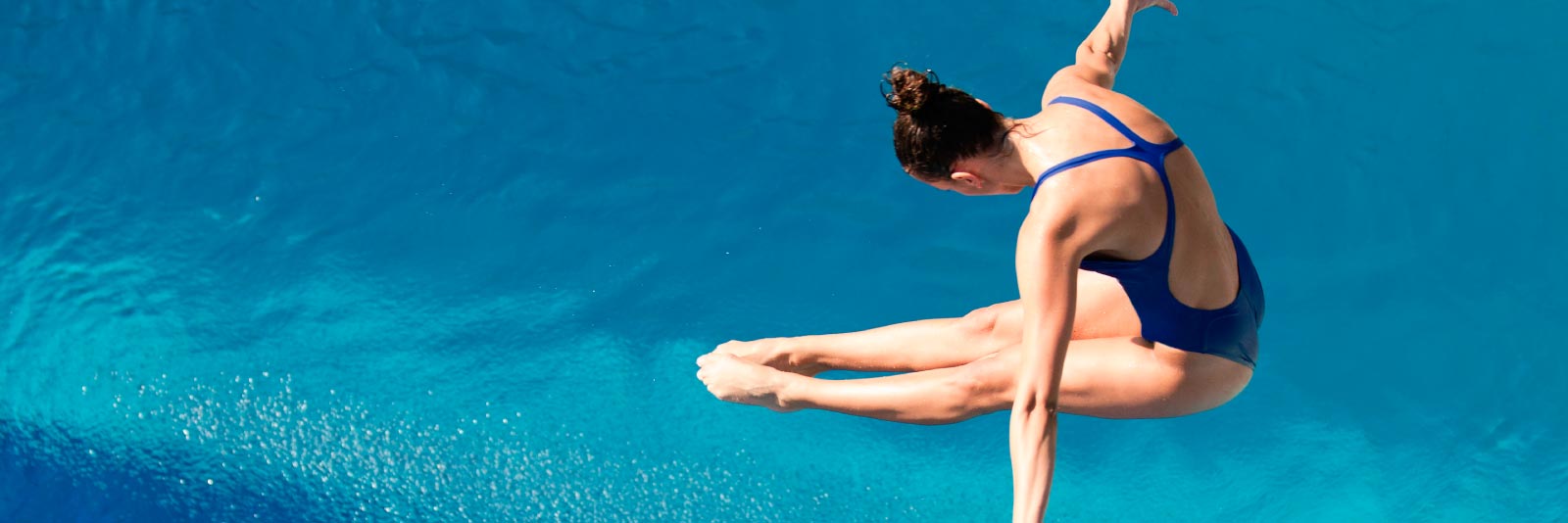How good do you have to be to dive in college?
While the sport of diving is centered on dive difficulty and scoring, that’s not what’s most important to coaches when evaluating college diving recruits. Instead, college coaches pay closer attention to how the athlete performs the dive, i.e. how well they’ve mastered the basics, than dive difficulty and the score received from the judges. Coaches also look for divers who are versatile and can perform dives from 1-meter and 3-meter springboards, as well as the 10-meter platform. When recruiting, college coaches tend to focus their efforts on attending events like National Junior Olympic, Senior Nationals, and National Championship where the level of competition best matches that of a college athlete.
What college coaches look for: Approach, take-off, execution and entry
Many recruits ask, “what dives do I need to dive in college?” But the reality is, college coaches want to see that a diver has mastered these basics, rather than specific dives, as an indicator that they are capable of competing at the next level. Here is what coaches look for in college diving recruiting:
- Approach to the dive: This should be a smooth progression forward to the edge of the board, usually three steps, with the diver’s body position straight, with arms either straightforward, to the sides or over the head.
- Take-off: The take-off is crucial, as the diver must clear the board safely as they jump from the edge to execute the dive. The athlete should practice taking off from one foot and landing on two feet, followed by departing from the board.
- Execution: As the diver is actually performing the dive, they need to be controlled, with proper technique before entering the water. Athletes need to hold the dive long enough for the judges to clearly identify their technique.
- Entry: Depending on the dive, the athlete will enter the water either feet-first or head-first. As they enter the water, the athlete’s body is nearly vertically straight, with feet together and toes pointed to create the least amount of splashing.
Do I need to compete in club diving?
Yes, recruits have the best opportunity to get recruited for college diving if they are competing at the national level with a club diving team. Unlike high school diving, club diving gives recruits access to important events like National Junior Olympic, Senior Nationals, and National Championship where coaches scout divers who meet the level of competition they are looking to recruit. To have the opportunity to compete at these events and be evaluated by college coaches, it’s important for divers to find a club team that will help them develop as an athlete and gain exposure to college coaches.
Additionally, at the high school level, divers only compete on a 1-meter springboard, while college programs compete on both 1-meter and 3-meter springboards and, depending on the meet, the 10-meter platform. As a result, high school diving meets and championships are not the best indicators of a highly skilled diver. Instead, college coaches look for competitive divers who dedicate their time to repetitive training with a year-round club diving team.
How good of a diver do I need to be to get an athletic scholarship?
Receiving college diving scholarships can be challenging because the swimming and diving teams share a scholarship budget. Generally, 85% of scholarships are allocated to the swim team and 15% to the dive team. For women, each NCAA Division 1 program is allotted 14 scholarships, while Division 2 programs are given 8 swimming and diving scholarships annually.
In order to earn college diving scholarships, recruits will need to demonstrate they can execute technically strong dives that will help them place high at the conference, regional and national levels. This is especially important because college swim teams often rely on the points scored by the team’s divers to boost their point total and edge out competition.
Unlike swimming, where college coaches focus on competition times when evaluating talent, diving coaches tend to focus more on a recruit’s techniques and understanding of the basics, rather than their diving scores.
The best recruiting strategy for a high school diver is to find a college program that can best utilize the athlete’s skillset in the next year or two. This means the diver may not score during their rookie year, but they have the potential to be a valuable asset to the team in the following years.
Insider Tip: Looking for scholarships near you? Explore women’s diving scholarships by state.
How is diving scored?
In competitive diving, points out of 10 are awarded to the athlete upon completion of the dive by a group of five judges. When totaling the points awarded, highest and lowest diving scores are disregarded, and remaining points are added together and then multiplied by the degree of difficulty, also known as the tariff. The degree of difficulty is determined by the components of the attempted dive.
What is a good score in diving?
Judges score in whole or half points along the following lines:
- Completely failed: 0 points
- Unsatisfactory: 0.5 to 2 points
- Deficient: 2.5 to 4.5 points
- Satisfactory: 5 to 6 points
- Good: 6.5 to 8 points
- Very good: 8.5 to 10 point
While a higher degree of difficulty gives the athletes greater potential for scoring more points, college coaches pay closer attention to how the athlete performs the dive, rather than the score they receive from the judges.
The role of video in the college diving recruiting process
Divers are highly encouraged to record every dive they perform, even if it’s just during club or high school practice. Because an athlete never knows when they’re going to nail a dive, this is a valuable recruiting tool for divers to capture all of their dive attempts and include strong performances in their highlight video to send to college coaches.
